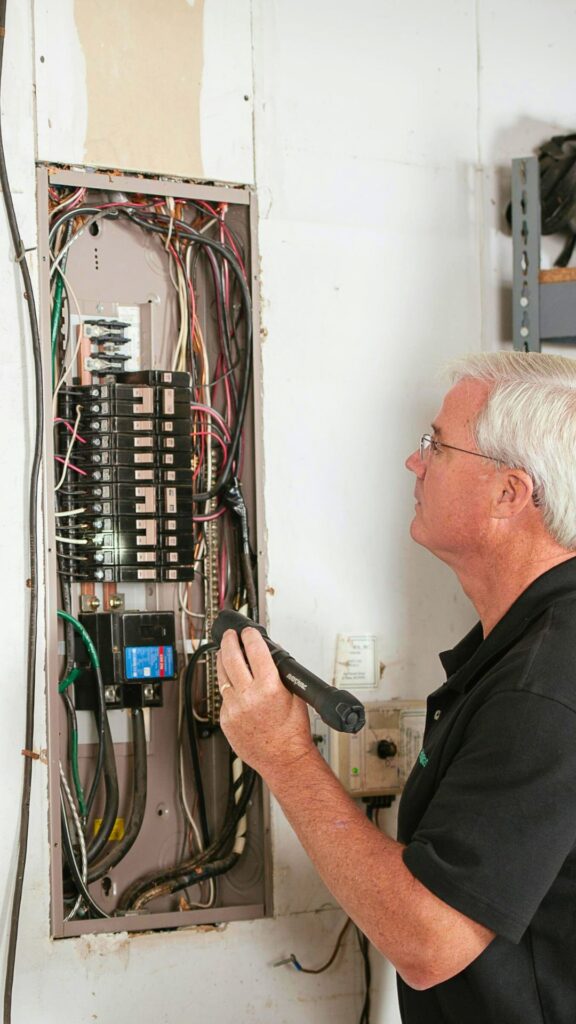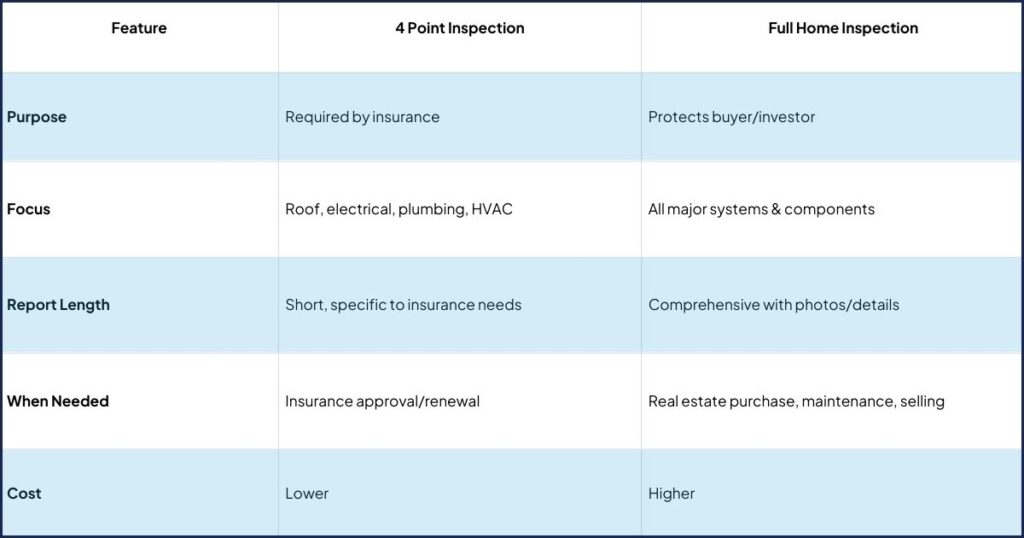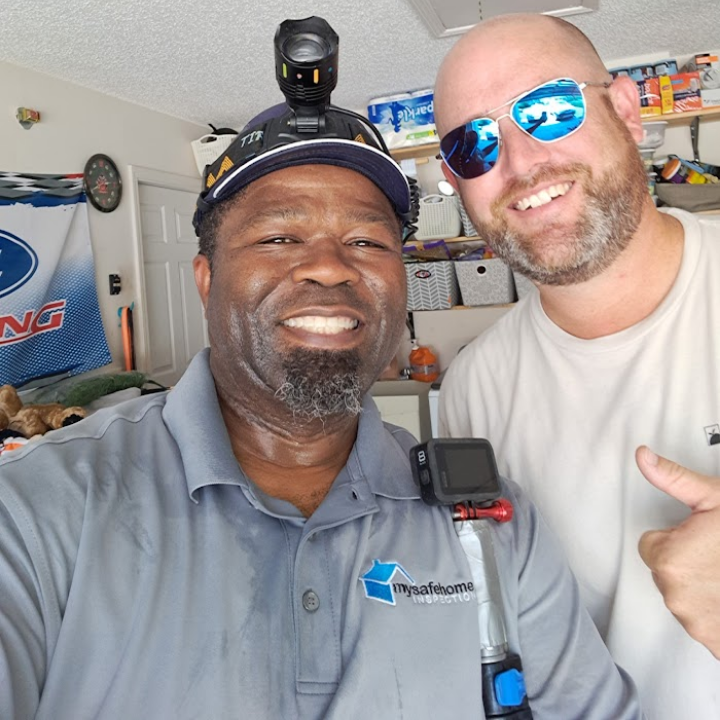Why the Right Inspection Type Matters
If you’re buying a home, renewing insurance, or simply making sure your property is safe, you’ll quickly find that not all inspections are the same. Two common inspection types in Florida are the 4 point inspection and the full home inspection.
Whether you’re shopping for a new insurance provider, or renewing your current home insurance policy, you may be asked for a current 4 point inspection report. This report helps underwriters understand the condition of your home’s four main systems: Roof, Electrical, Plumbing, and HVAC. The goal is to verify that these systems are in good working order and do not pose an undue risk.
Many buyers and sellers opt to get a full home inspection before buying or selling a house. A full home inspection looks at a home from top to bottom, literally. This report provides insights into the home’s overall condition with detailed notes and photos of every room and system. Identifying existing problems and safety hazards (or the lack thereof) can help buyers and sellers negotiate pricing and provide clarity throughout the process.
While they sound similar, they serve very different purposes. Knowing the difference can save you time, money, and stress, and help you meet insurance or lender requirements.
What Is a 4-Point Inspection?
A 4 point inspection is a focused evaluation of four major systems in a home:
- Roof – Condition, age, and signs of leaks or damage.
- Electrical System – Wiring, panels, and safety hazards.
- Plumbing System – Pipes, water heaters, and visible leaks.
- HVAC System – Heating, ventilation, and air conditioning functionality.
Insurance companies in Florida often require this inspection before they’ll issue or renew a policy. The goal is to assess whether the home’s major systems are in good enough condition to minimize risk.
Unlike a full home inspection, a 4-point inspection doesn’t cover every detail of the home, it’s strictly focused on these four areas.

What Is a Full Home Inspection?
A full home inspection is a much more comprehensive evaluation. Licensed inspectors examine the property’s structure, systems, and safety concerns from top to bottom.
A typical full home inspection includes:
- Roof and attic
- Foundation and structure
- Electrical systems
- Plumbing systems
- HVAC systems
- Windows, doors, and insulation
- Interior and exterior finishes
- Drainage and grading
The result is a detailed home inspection report that provides a complete picture of the home’s condition. This type of inspection is most often ordered during a real estate transaction, but many homeowners also schedule them before renovations or as part of ongoing maintenance. For a more in-depth look at what is covered in a full home inspection, check out our blog Home Inspection Checklist: What Is Looked for in a Home Inspection.
Key Differences Between 4-Point and Full Home Inspections
Both inspection types are valuable, but they serve different needs.

When You Need a 4-Point Inspection
You’ll likely need a 4 point inspection if:
- You’re purchasing an older home (often 20+ years).
- Your insurance company requires it for a new policy.
- You’re renewing a homeowner’s policy in Florida.
Insurers want to know whether the home’s major systems are safe and up to standard. If issues are found, you may need to make repairs before coverage is approved.
When You Need a Full Home Inspection
A full home inspection is recommended when:
- You’re buying a home and want to understand its overall condition.
- You’re selling a home and want to avoid surprises during negotiations.
- You’re planning renovations and need to know what hidden issues exist.
Skipping a full home inspection can lead to costly surprises like foundation problems, hidden leaks, or safety hazards that a 4-point inspection won’t catch.
Do You Ever Need Both?
In many cases, yes. For example, if you’re buying a home in Florida, you may need both a full home inspection (to understand what you’re buying and negotiate price before closing) and a 4 point inspection (to satisfy insurance requirements).
The good news? Many inspection companies offer bundled services to save you money when you need both.
Cost Comparison: 4-Point vs. Full Home Inspection
- 4-Point Inspection Cost: Usually lower since it’s limited to four systems.
- Full Home Inspection Cost: Higher, but more comprehensive.
Think of it this way: a 4 point inspection protects your ability to get insurance, while a full home inspection protects your financial investment in the home. At My Safe Home Inspection, a 4-point inspection is typically $150 and a full home inspection is usually $449. However, if you provide us with your insurance agent’s information, you will receive their discounted Signature Pricing, bringing the cost down to $135 for a 4 point inspection and $399 for a full home inspection.
Common Misconceptions About 4-Point Inspections
Myth #1: A 4-Point Inspection Is All You Need When Buying a Home
Wrong. A 4-point inspection won’t tell you if the foundation is cracked, if the windows are leaking, or if the attic has mold.
Myth #2: Full Home Inspections Aren’t Necessary for Newer Homes
Even new construction can have defects, like faulty wiring or improper installation. A home inspection helps catch these issues early in the buying process.
Myth #3: 4-Point Inspections Are Optional in Florida
Not always. Many insurance companies won’t issue coverage without it, especially for older homes.
How to Choose the Right Inspector for Both Types
Whether you need a 4 point inspection, a full home inspection, or both, choosing the right home inspector matters. Look for:
- State licensing and certification
- Experience with Florida homes
- Clear, photo-supported reports
- Positive reviews and proven reputation
- Knowledge of both insurance and buyer requirements

Final Thoughts: Which Inspection Type Is Right for You?
When it comes to inspection types, the answer isn’t always either/or, it depends on your situation.
- If you’re buying or selling a home you should choose a Full Home Inspection
- If you’re securing or renewing insurance you should opt to get a 4 Point Inspection
- If you’re doing both , bundle both inspections to save time and money and cover all bases
Skipping either one can expose you to risk, whether it’s financial surprises during closing or difficulties getting insurance.
Ready to schedule your inspection? Our experienced team in Florida offers both 4 point inspections and full home inspections, helping you meet insurance requirements while protecting your new home.
